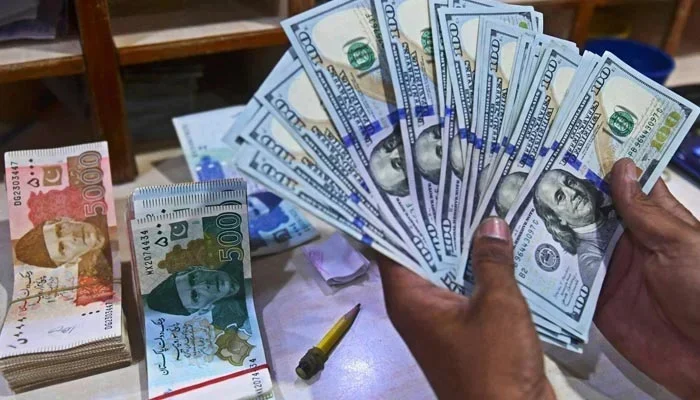- Workers’ remittances increase by 4.9% month-on-month.
- Remittances for July-Feb FY2023 drop 10.8% to $17.99bn.
- Highest remittance inflows sent by Pakistanis in Saudi Arabia.
Remittances sent home by overseas workers dropped 9.5% to $2 billion in February 2023, year-on-year, as exchange rate fluctuations, economic uncertainties, and lack of trust in the system continued to encourage the use of illegal channels.
According to data released by the State Bank of Pakistan (SBP) on Friday, remittances stood at $2.2 billion in the same month of the previous year.
On the other hand, month-on-month, these inflows increased by 4.9% compared to $1.9 billion recorded in January 2023.
Remittances for the first eight months (July-February) of the fiscal year 2022-23 were recorded at $17.99 billion, showing a fall of 10.8% compared to $20.18 billion in the same period of FY2022.
A breakdown shows the highest amount of remittances during February 2023 was mainly sent home from Saudi Arabia ($454.6 million), followed by the United Arab Emirates ($324.0 million), the United Kingdom ($317.0 million) and the United States of America ($219.4 million).
The SBP-held foreign exchange reserves rose above the $4 billion mark after the cash-strapped nation received a $500 million loan from a Chinese bank.
The central bank, in its weekly bulletin, said that its foreign exchange reserves have increased by $487 million to $4,301 million as of the week ended March 3, which will provide an import cover of around a month.
The SBP received $500 million last week from the Industrial and Commercial Bank of China (ICBC) as part of the institution’s $1.3 billion facility, just days after it had received $700 million from the China Development Bank.
Remittances have been thinning out steadily and the trend is likely to press ahead of Ramazan, the holy month of fasting, and Eid-ul-Fitr — the most difficult times for inflation-ravaged citizens — when overseas workers remit large amounts to Pakistan to support their loved ones.
There has been an improvement in dollar supply, but the country needs more liquidity to cope with the demand for imports.
Moreover, closing the gap between the open market and the interbank market is imperative to discourage the wholesale use of unofficial channels.
Given its bare minimum foreign exchange reserves, Pakistan direly required dollar inflows that have not been very steady.
Finance Minister Ishaq Dar said on Thursday Pakistan was “very close” to signing a staff-level agreement with the International Monetary Fund (IMF), which would offer a critical lifeline for taming a balance of payment crisis.
An agreement would release $1.1 billion to the cash-strapped South Asian economy.
“We seem to be very close to signing the staff level agreement, hopefully, God willing, in the next few days,” Dar said at a seminar in Islamabad.
“I and my team are absolutely committed to complete this program to the best of our ability,” he said, adding: “We have been in the review and I think it has taken longer than it should have in my opinion.”
Islamabad has been hosting an IMF mission since early February to negotiate the terms of a deal, including the adoption of policy measures to manage its fiscal deficit ahead of the annual budget due around June.
The funds are part of a $6.5 billion bailout package the IMF approved in 2019, which analysts say is critical if Pakistan is to avoid defaulting on external debt obligations.

 Latest News3 days ago
Latest News3 days ago
 Latest News3 days ago
Latest News3 days ago
 Entertainment3 days ago
Entertainment3 days ago
 Latest News3 days ago
Latest News3 days ago
 Latest News3 days ago
Latest News3 days ago
 Latest News3 days ago
Latest News3 days ago
 Latest News3 days ago
Latest News3 days ago
 Latest News3 days ago
Latest News3 days ago

























